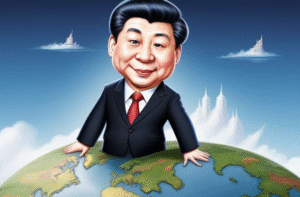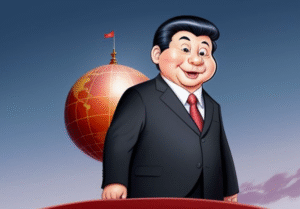$FXI $JD $BABA
#China #TradeWar #TrumpTariffs #Globalization #Multilateralism #Beijing #BusinessLeaders #PremierLi
China’s Premier Li Keqiang asserts the nation’s readiness to withstand any potential ‘shocks’ from new tariffs threatened by former US President Donald Trump. The Chinese leadership expressed this resilience during a gathering with global business leaders, offering a hint at the country’s strategic economic direction amid growing geopolitical tensions.
During the meeting, Premier Li proclaimed that China is choosing to pursue a path of globalization and multilateralism, positioning itself as a key player in the global economy. This move comes as a bold statement in the face of increased protectionist measures worldwide, particularly from the United States, under Trump’s administration. The Chinese government’s commitment to global cooperation and open markets is a clear indication of its intent to maintain economic stability and growth, even in the face of potential future shocks.
The potential impact of these tariffs on global markets is varied and significant. For instance, US-listed Chinese stocks such as Alibaba (BABA) and JD.com (JD) could be affected, along with exchange-traded funds (ETFs) that track Chinese equities, like the iShares China Large-Cap ETF (FXI). The uncertainty surrounding these tariffs might lead to increased market volatility and a potential shift in investor sentiment towards these assets.
However, China’s stance on globalization and multilateralism also carries potential benefits. By maintaining open markets and promoting global cooperation, China could bolster its trading relationships with other nations. This could lead to increased economic activity, benefiting both China and its trade partners. Furthermore, it might also provide alternative investment opportunities for global investors, who could capitalize on China’s commitment to economic openness.
On the domestic front, China’s commitment to globalization could also result in a more robust and resilient economy. By embracing international trade and cooperation, China can diversify its economic portfolio, reducing its reliance on any single market or sector. This diversification could help insulate the Chinese economy from external shocks, such as those potentially brought about by new tariffs.
In conclusion, while the threat of new tariffs from the US remains a concern for China, Premier Li’s recent comments suggest the nation is prepared to navigate these challenges. By committing to globalization and multilateralism, China is positioning itself to withstand potential future shocks and continue its trajectory of economic growth. This approach offers a measure of reassurance for investors and stakeholders in the Chinese economy, providing a sense of stability amidst the uncertainties of the global economic landscape.











Comments are closed.